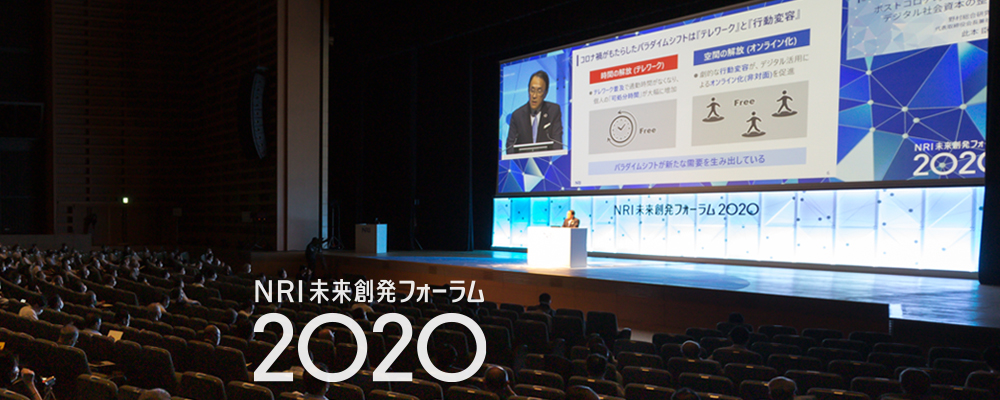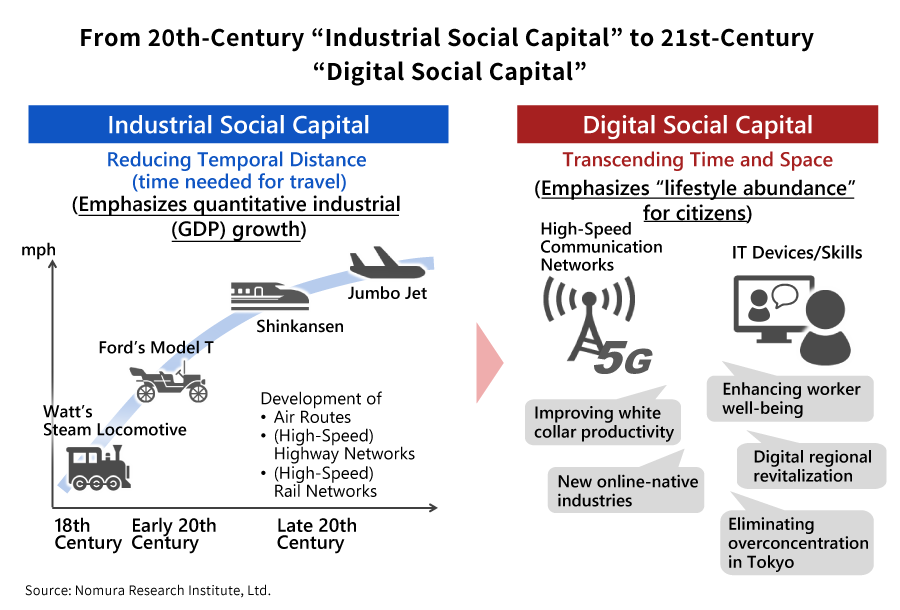
Possibilities for the Post-Corona Society and Economy: NRI Dream Up the Future Forum 2020
On October 5, 2020, Nomura Research Institute (NRI) held “NRI Dream Up the Future Forum 2020”. In a year when the Covid-19 has thrust the entire world into an unprecedented global crisis, the Forum centered on the theme of “Covid-19 and socioeconomic paradigm shifts”, with presenters analyzing the impact of the rapid advancement of digitalization on our lives, work, and values, and offering recommendations related to the possibilities for business in the post-corona era and the importance of digital social capital development.
The Forum also examined the social and economic possibilities of the post-corona era, drawing on special lectures and dialogues from invited experts.
Towards an era that emphasizes “lifestyle abundance” transcending time and space
To begin, NRI Representative Director and President Shingo Konomoto took the stage and delivered a keynote speech entitled “Developing Digital Social Capital for the Post-Corona Era”.
A review of global quarterly GDP shows substantial and near-universal damage in both advanced and emerging economies as a result of the coronavirus pandemic. Many observers believe that the effects of the pandemic will continue to be felt for some time, with some predictions anticipating weaker economic recovery in Japan than in Europe and the United States.
The coronavirus pandemic has brought economic activity to a standstill, while simultaneously creating two paradigm shifts toward “temporal freedom” and “spatial freedom”. Konomoto offered this analysis: “Telework has sharply reduced the time spent on commuting and transit, and has drastically increased the ‘disposable time’ available to individuals. In addition, the effects of the spatial freedom created by the drive toward online (non-face-to-face) interactions as a result of the dramatic behavior modifications of refraining from traveling can be seen, for example, in the increase in online store sales and the expanding ability of entertainment businesses to attract customers.”
According to NRI’s calculations, telework could free up as much as 3.73 million hours of commuting time per day in Japan as a whole, and this increase in disposable time could lead to 2.2 trillion yen per year in additional consumption.
A July 2020 survey conducted by NRI found the number of employees with telework experience to be approximately 30% for Japan as a whole, and roughly half in the case of major Japanese corporations with 1,000 or more employees.
Many people have discovered monetary value in telework as well. To the question “Are you willing to accept a lower income if you can choose/continue to work at home”, approximately 25% of respondents, particularly those in their childrearing years, responded that they were, and the average amount indicated was 12,758 yen/month. This is equivalent to roughly half of the 25,369 yen/month in non-statutory benefits paid per employee by Japanese corporations.
It is often noted that telework leads to declining productivity, but verification tests within NRI found that the impact of telework-related productivity declines was limited, and that improved work-life balance was actually connected to improved productivity. Konomoto emphasized that “it is important for us to exercise ingenuity at the micro level to prevent communication breakdowns, and search for new ways of working that combine telework with occasional commuting to the office.”
In the US, online businesses have expanded swiftly due to the “spatial freedom” of online work, and many D2C (Direct to Customer) brands have come on the scene. The appearance of platforms that support D2C businesses such as “Shopify” has spurred the rapid emergence of D2C businesses specialized for apparel, food, and various other categories. Konomoto observed, “Dense cultures and communities are formed by presenting the ‘value of experiences that only happen here’, and business models that excite new demand by gradually incorporating such value will become the new dominant trends of the post-corona era.”
In Japan, the government is expected to promote digital policies robustly, but the current penetration of “My Number” national identification cards stands at only 24.69 million (as of September 2020), less than the targeted penetration rate of 30% (approx. 40 million). If the barriers to digital ID implementation for citizens are not overcome, the digitalization of national and local government activities will not move forward.
In the latest values released for the “DCI” (digital capability index) digital economic/social performance indicator proposed by NRI last year, results showed that the biggest gap between Tokyo and other prefectures was in the area of IT-related “human capital”. To raise the floor for digital human capital in regional areas, staff dispatching and the like from central government agencies and corporations in metropolitan areas will be essential policies, and new revenue source measures will be needed.
The “industrial social capital” model that was dominant until the end of the 20th century centered on infrastructure investments aimed at reducing temporal distance; these investments, in combination with mass-produced technologies from corporations, drove quantitative economic expansion. By contrast, the aim of 21st-century digital social capital is to transcend the limits of time and space. This new paradigm emphasizes “lifestyle abundance”, in which people engage in economic and social activity without being constrained by time and space, while maintaining and enhancing their state of physical, emotional, and social satisfaction (well-being).
Konomoto brought his speech to a close by emphasizing, “What’s important for Japan today is to create big ideas about how we will direct the new society brought about by the coronavirus pandemic toward the future.”

A view of the post-corona new normal
The next presentation was a special video lecture by Arun Sundararajan, professor at NYU’s Stern School of Business, entitled “The New Normal for the Post-Corona Era”.
Observing that “the various social changes caused by the coronavirus crisis point the way to a ‘new normal’ for the post-corona era”, Sundararajan argued that the key to understanding this transformation is not merely technological change, technomics (economic factors driving technological change), or systemic change (labor market and political factors), but “the behavioral changes that are already occurring. When people order meals online, or hold meetings and classes online, those behaviors can become deep-rooted life activities that will remain normal even after the coronavirus crisis.”
This digital new normal can be seen in a number of business sectors, including retail, restaurants and bars, tourism, healthcare, and education. As keywords for defining the new normal, Sundararajan listed “digital”, “adaptability”, “resilience”, and “diversification”.
“Person-to-person interactions mediated by digital space are an essential aspect of the digital age. I believe that companies will be required to adapt to unforeseen economic conditions and new business environments, and that investment in cost minimization and economic efficiency maximization will decrease while investment in strengthening resilience increases. The movement to reconstruct business models will intensify, and the need to pursue business diversification to strengthen resilience against economic uncertainty will deepen.”
Sundararajan also noted that the accelerating transition of spaces of human interaction into the digital realm has made it necessary to redesign the structure of the digital world. He emphasized, “We spent centuries carefully designing frameworks for our governments and economies, but no time at all on system design for the digital world. We have to begin consciously designing the digital world we want to live in.”
Business requires a perspective stressing long-term value, and flexible and new approaches to work
Finally, a special dialogue on possibilities for business and approaches to work in the post-corona era was held between Konomoto and Makiko Eda, Japan Representative to the World Economic Forum. *1
Discussing The Great Reset, a recent book on the post-corona world by World Economic Forum founder Dr. Klaus Schwab, Eda asserted, “This moment calls on us to treat the global crisis of the coronavirus pandemic as a precious opportunity to rethink and reset our world, and to create a richer and brighter future”.
Konomoto observed, “ESG *2 and SDGs *3 are currently major managerial issues for Japanese companies, but I think we must strengthen the approach of starting by sketching out an image of an ideal society, and then backcasting from that image and debating what you can achieve. You have to be able to integrate a lot of different stimuli, from a global perspective.” Eda agreed, stating, “To move global-scale challenges in a positive overall direction, the role of corporations must include the perspective of long-term value as well as short-term profits. Managers around the world are actively debating how to seize the reins of this transition; I would like to see Japanese companies make their voices heard as well.”
Konomoto then asked Eda, “What do you think needs to be done to ensure that this new approach to work, in which Japan has integrated telework, takes hold?”, to which Eda replied, “Women and men need to share housework, education, and care.” Eda continued, “In actually creating balance between work and home life, people will recognize the need for flexible new ways of working. If you are only prompted by peer pressure from other companies doing the same thing, you will only revert to old patterns. Managerial judgment will be critical for the transition to work styles that can make employees and their families happier.”
In response, Konomoto concluded the dialogue by observing, “All of us need to recognize the value of things that would not have been possible if it wasn’t for telework, and that have been made possible precisely because of telework”, and then closed the Forum.
***
This year’s Dream Up the Future Forum was forced to depart from previous formats due to Covid-19, and adopted a hybrid model of exhibition hall presentation plus online access. Thorough preventive measures were in place in the exhibition hall; the number of audience numbers was limited to ensure social distancing, and live streaming was used to allow more people to listen. The people in the hall cooperated with temperature screening, disinfection, and mask wearing protocols, allowing the event to be conducted safely.
-
*1
World Economic Forum: Nonprofit international organization founded in 1971, in which government, private-sector, and civil leaders (international organizations, academic organizations, NGOs, etc.) gather to try to solve global challenges on the basis of an Agenda (action plan).
-
*2
ESG: Stands for “Environment”, “Social”, and “Governance”, the three central elements for measuring the sustainability and social impact of corporations and investments in corporations.
-
*3
SDGs: International targets aimed at creating a sustainable and better world by 2030.